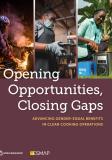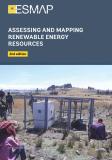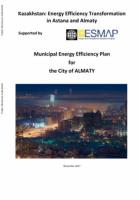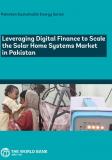Publications
The study was conducted between November 2016 and November 2017 in Almaty, using the Tool for Rapid Assessment of City Energy (TRACE 2.0). The objective of this study is to outline an urban EE strategy for the next 13 years for the city of Almaty, up to 2030, by assessing the energy performance of the municipal service sectors and identifying and prioritizing EE opportunities along with a sound implementation plan. The overarching objectives of the municipal EE plan are to reduce energy consumption, diminish related expenditures from the municipal budget, and improve municipal service delivery for city residents. The plan includes a host of qualitative targets, from reducing the Greenhouse Gas (GHG) emissions and Primary Energy Consumption (PEC), avoiding an increase in the energy bills to improving performance of local public service providers and enabling the environment to attract private investments for EE interventions.
World Bank. 2017. Municipal Energy Efficiency Plan for the City of Almaty. World Bank, Washington, DC. © World Bank. https://openknowledge.worldbank.org/handle/10986/28927 License: CC BY 3.0 IGO.




